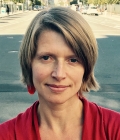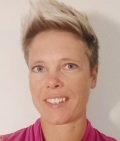Instructor List |
2025-07-04 |
The following instructors and speakers have agreed to contribute their expertise to the success of Buck Institute Course:
 |
Birgit Schilling, Ph.D. Birgit is Associate Professor and the Director of the Mass Spectrometry and Chemistry Core at the Buck Institute for Research on Aging in Novato, CA. Research projects include investigations of neurodegenerative diseases, aging, cancer, mitochondrial damage, protein posttranslational modifications including acetylation in bacteria, the role of surface glycoconjugates in bacterial pathogenesis etc., but also mass spectrometric method development. Birgit has worked in the field of protein quantitation to assess differential protein expression or changes in posttranslational modifications, particularly using selected reaction monitoring stable isotope dilution mass spectrometry (SRM-SID-MS), and other chemical and metabolic labeling quantitative workflows, i.e., iTRAQ and SILAC technologies. Birgit has participated in large multi-laboratory SRM verification studies taking advantage of Skyline’s platform independent features. In recent years, she has used more and more label free protein quantitation approaches to investigate discovery mass spectrometric data sets (Skyline MS1 Filtering), as well as newer quantitative workflows, such as high resolution data-independent acquisitions (SWATH and PRM). Birgit has co-developed some algorithms for the Skyline Tool Store and she also extensively uses the interactive data sharing features of the Panorama webserver. |
|
 |
Ruth Huttenhain, Ph.D. Ruth Huttenhain is an Assistant Adjunct Professor at University of California San Francisco (UCSF). During her Ph.D. with Prof. Ruedi Aebersold at the Institute of Molecular Systems Biology, ETH Zurich, Ruth developed high-throughput and large scale targeted mass spectrometric approaches and applied them to the verification of plasma-based biomarkers. In 2013 Ruth joined the lab of Prof. Nevan Krogan at UCSF as a Postdoctoral Scholar. Her postdoctoral and current research focuses on leveraging quantitative mass spectrometry and genetic approaches to study dynamics of protein interaction networks combining classical affinity purification and novel proximity-based biotinylation approaches. |
|
 |
Brendan MacLean Brendan worked at Microsoft for 8 years in the 1990s where he was a lead developer and development manager for the Visual C++/Developer Studio Project. Since leaving Microsoft, Brendan has been the Vice President of Engineering for Westside Corporation, Director of Engineering for BEA Systems, Inc., Sr. Software Engineer at the Fred Hutchinson Cancer Research Center, and a founding partner of LakKey Software. In this last position he was one of the key programmers responsible for the Computational Proteomics Analysis System (CPAS), made significant contributions to the development of X!Tandem and the Trans Proteomic Pipeline, and created the LabKey Enterprise Pipeline. Since August, 2008 he has worked as a Sr. Software Engineer within the MacCoss lab and been responsible for all aspects of design, development and support in creating the Skyline Targeted Proteomics Environment and its growing worldwide user community. |
|
 |
Michael J. MacCoss, Ph.D. Mike became interested in biomedical applications of mass spectrometry while working in Dr. Patrick Griffin’s protein mass spectrometry lab at Merck Research Laboratories. He obtained a Ph.D. with Professor Dwight Matthews and pursued a postdoc with Professor John R. Yates III. In 2004 he started the MacCoss lab at the University of Washington and it became obvious that while mass spectrometry data could be collected quickly and robustly, the lack of computational tools for the visualization and analysis of these data was a stumbling block. In 2009 he recruited Brendan MacLean with the goal of developing professional quality software tools for quantitative proteomics. Mike has worked closely with the Skyline development team and our outstanding group of laboratory scientists and collaborators to ensure that our software uses analytical approaches that have been thoroughly vetted by the mass spectrometry community. |
|
 |
Kendra Adams, Ph.D. Kendra is a joint postdoctoral associate between Dr. Arthur Moseley’s lab, the Duke Proteomics and Metabolomics Shared Resource, and Dr. Carol Colton in the Department of Neurology at Duke University. She currently uses mass spectrometry to study Alzheimer’s disease in new mouse models. Kendra earned her PhD in Dr. Francisco Fernandez-Lima’s Lab at Florida International University where she analyzed small molecules using LC-TIMS-MS. Her current research focuses on method development for targeted biomarker analysis and stable isotope tracing for Alzheimer’s disease. | |
 |
Chris Ashwood, Ph.D. During Dr. Ashwood’s graduate studies with Dr. Nicolle Packer, he developed expertise in the structural analysis of released glycans from mammalian glycoproteins using porous graphitized carbon (PGC)-based LC-MS/MS. In his post-doctoral training in Dr. Gundry’s laboratory, Dr. Ashwood, has applied these methods to develop the first N- and O- glycan maps of primary human cardiomyocytes and stem cell-derived cardiomyocytes, characterizing glycans that are potentially useful for identifying cells of various cell culture stages and cell types. With a long-term goal of developing automated analytical workflows for characterization and quantification of glycans, he also actively works to improve the bioinformatic analysis of glycan and glycopeptide MS data.To date, his scientific contributions include 8 peer reviewed publications and one manuscript in revision, of which he is first author on 4. He has also recently received a prestigious Postdoctoral Career Development Award from the American Society for Mass Spectrometry. |
|
 |
Brett Phinney, Ph.D. Brett has been researching the analysis and measurement of complex mixtures of proteins and peptides using mass spectrometry since 1996, where as a grad student he used mass spectrometry to study the protein dynamics of viral structural proteins. After graduate school he then did a post doc with noted mass spectrometrist Jack Watson at Michigan State University and then went on to co-found and co-direct the Michigan Proteome consortium is 2002. In 2005 Brett founded the UC Davis Genome Center proteomics core and currently directs its research and oversees its staff. The UC Davis proteomics core is currently researching ways to increase efficiency, sensitivity & quantitative accuracy in bottom-up proteomics applications.Dr. Phinney has been an member of ABRF www.abrf..org where he is/was a member of several international research groups that develop proteomics standards and methods for the proteomics community. |
|
 |
Lindsay K. Pino, Ph.D. Lindsay is a postdoctoral researcher in Dr. Ben Garcia’s lab at the University of Pennsylvania where she uses quantitative mass spectrometry to study epigenetics. Before going to the University of Washington for graduate school, she spent two years in South Korea as a Fulbright scholar and three years working as a research associate in Dr. Steve Carr's Proteomics Platform at the Broad Institute of MIT and Harvard. She earned her PhD under the joint advisorship of Drs. Michael J. MacCoss and William Stafford Noble. There, she developed techniques for data independent acquisition mass spectrometry, in particular the challenges associated with scaling up quantitative mass spectrometry experiments. Her research interests are in the roles proteins play in nuclear organization and the maintenance of genomic stability. |
|
 |
Brian Searle, Ph.D. Brian is a Translational Research Fellow at the Institute for Systems Biology. Brian received his chemistry BA at Reed College in 2001. In 2004, he co-founded Proteome Software with Mark Turner and Dr. Ashley McCormack to produce and distribute cutting-edge data analysis software for proteomicists. In 2014, he returned to academia to earn his PhD with Dr. Michael MacCoss at University of Washington, where he developed methods to detect and quantify proteins and phosphosites using mass spectrometry. In 2018, he joined the Institute for Systems Biology as an independent fellow to build a research program that spans the intersection of proteomics, mass spectrometry, bioinformatics, and technology development to study human genetic variation. |
|
 |
Vagisha Sharma Vagisha got involved with proteomics at UC San Diego where she worked with Prof. Vineet Bafna. During that time she built her first tools for visualizing Mass Spectrometry data while working at ActivX Biosciences. Since moving to Seattle Vagisha has worked on Mass Spectrometry pipelines for the Aebersold group at the Institute for Systems Biology, and developed a data management system while at the University of Washington Proteomics Resource and the Yeast Resource Center. She joined the Skyline team in October 2011 where she has been the lead developer for the Panorama Targeted Proteomics Knowledge Base. |
|
 |
Irene van den Broek, Ph.D. Irene has over 10 year experience in quantitative, targeted, mass spectrometry of peptides and proteins, particularly for pharmaceutical and clinical applications. After she obtained her Ph.D. in peptide bioanalysis in the Netherlands, she competed as a professional cyclist before getting back to science as a post-doctoral scientist at the department of Clinical Chemistry and Laboratory Medicine in Leiden, the Netherlands. Here, she worked on the development of mass-spectrometry based clinical assays for protein biomarkers to improve harmonization and standardization of clinical diagnostic tests. She placed particular focus on understanding the sources of error in a typical bottom-up targeted proteomics workflow. In 2015, Irene joined the laboratory of Dr. Jennifer Van Eyk at Cedars-Sinai Medical Center in Los Angeles, CA, to work on the coupling of micro sampling and at-home blood collection to high-throughout, multiplexed, quantitative mass spectrometry methods, including MRM and DIA. She currently leads the Clinical R&D of the newly founded Cedars-Sinai Precision Biomarker Laboratories in Los Angeles, CA. This mass spectrometry-based specialty laboratory is a consortium of academic, contract-based and clinical (CLIA certified) laboratories with a main aim to translate biomarker discovery into clinical tests. |